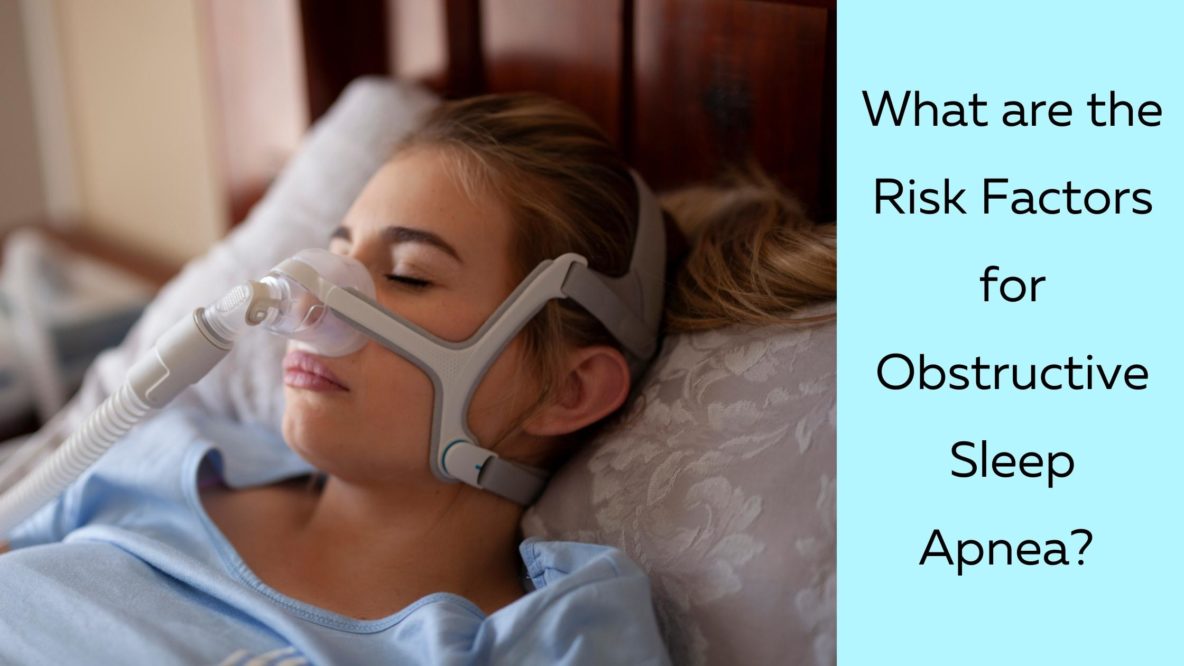What are the Risk Factors for Obstructive Sleep Apnea?

- A Promising Paradigm Shift: New Research Challenges the CPAP-First Approach to OSA Treatment - September 5, 2023
- Understanding Sleep Meditation Techniques - July 30, 2021
- How Online Learning Has Affected Sleep for Students - July 13, 2021
Sleep apnea is a common sleep disorder that makes it hard to breathe during the night. People of all ages can have sleep apnea, but it’s more common in adults and older adults. Obstructive Sleep Apnea (OSA) can be caused by lifestyle factors or hereditary traits.
What is Obstructive Sleep Apnea?
OSA is a serious sleep disorder. During the night, OSA can cause your breathing to stop repeatedly while you sleep. This happens because the muscles in your upper airway, throat, or tongue get overly relaxed while you sleep. They can become so loose that they block your airway, stopping your breathing. Your breathing can be cut for up to 10 seconds before your reflexes kick in. You may wake up with a start, choking or gasping or air. Or you may wake for just a split second and you won’t remember waking up at all.
Sleep apnea can be mild, moderate, or severe.
- Mild: Your breathing stops and starts 5 to 15 times every hour, or you have periods of shallow breathing that interfere with oxygen flow.
- Moderate: You experience 15 to 30 instances of stopped breathing every hour.
- Severe: Your breathing stops more than 30 times every hour.
You might not realize you have sleep apnea at first. You may fall asleep immediately after waking, or not realize that your breathing has been interrupted.
Signs of Sleep Apnea
Instead, you may notice the signs of sleep apnea. These can include:
- Heavy snoring through the night
- Mood swings such as irritability or sadness
- Nighttime sweating
- Daytime drowsiness or excessive fatigue
- Waking with a headache
- Waking up with a dry mouth or a sore throat
- Having a hard time focusing or concentrating
- Decreased libido
Risk Factors for Sleep Apnea
OSA can affect anyone, but there are a few risk factors that could make you a lot more likely to develop sleep apnea. Here are some of the most common risk factors for obstructive sleep apnea:
- Age: Older adults are more likely to have OSA. Middle-aged and older adults have a much higher risk of developing sleep apnea than younger adults or children.
- Gender: Men are almost twice as likely to have sleep apnea than women. Older men have far higher rates of sleep apnea than women.
- Obesity: Being overweight is a risk factor for sleep apnea. Extra fat deposits around the neck can increase the chances of experiencing a blocked airway during the night. Roughly two-thirds of people with OSA are overweight.
- Heredity: If you have a family history of obstructive sleep apnea or snoring, you may be more likely to develop sleep apnea.
- Large tonsils or a thicker neck circumference: These can decrease the size of your airway, and increase your risk of sleep apnea.
- Narrow airway: Some people have naturally narrow airways. This increases the chances the airway will get blocked during sleep.
- Nasal congestion: If you’re prone to allergies or nasal congestion, you may also develop sleep apnea. Any condition that makes it harder for you to breathe through your nose increases your risk of sleep apnea.
- Alcohol consumption: Drinking alcohol before bed can relax your muscles. This makes it more likely that the muscles in your upper airway get too relaxed during the night, blocking the airway and cutting off the flow of air.
- Smoking: Smoking cigarettes can cause OSA. It can irritate the lining of the throat, lead to inflammation or fluid retention in the upper airway, and ultimately decrease the size of your airway.
- Medical conditions: Some health conditions are also risk factors for sleep apnea. Heart disease, high blood pressure, asthma, and diabetes can all increase your risk of developing OSA.
Sound Sleep Medical
Have you been feeling fatigued during the day and can’t figure out why? Consider these risk factors for sleep apnea. If any of these factors sound like you, and you have noticed some signs of OSA, come see us right away. We’ll help you get to the bottom of your sleeplessness, and get you back on track to sleeping soundly. The sleep experts and Sound Sleep Medical can help you find the right treatment option. Whether it’s developing better sleep hygiene or using a continuous positive airway pressure (CPAP) machine at night, we’ve got you covered.
